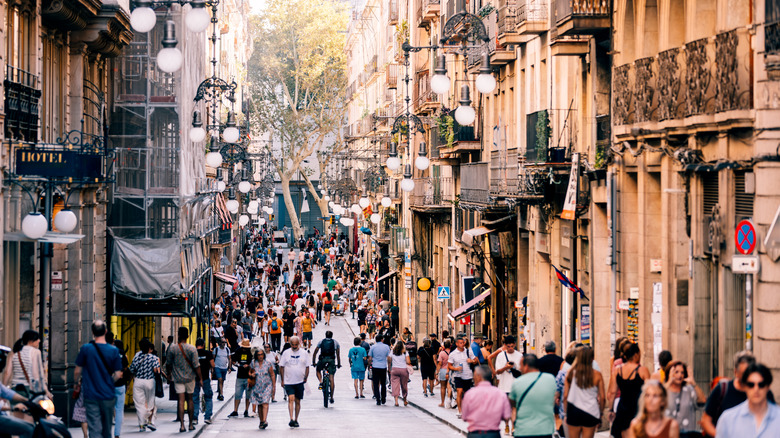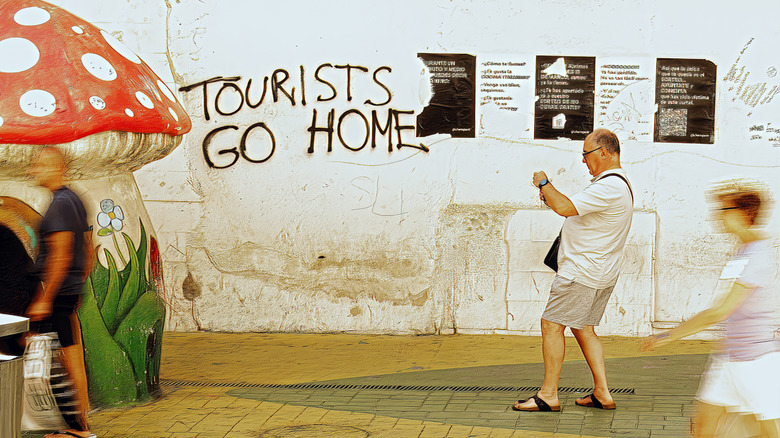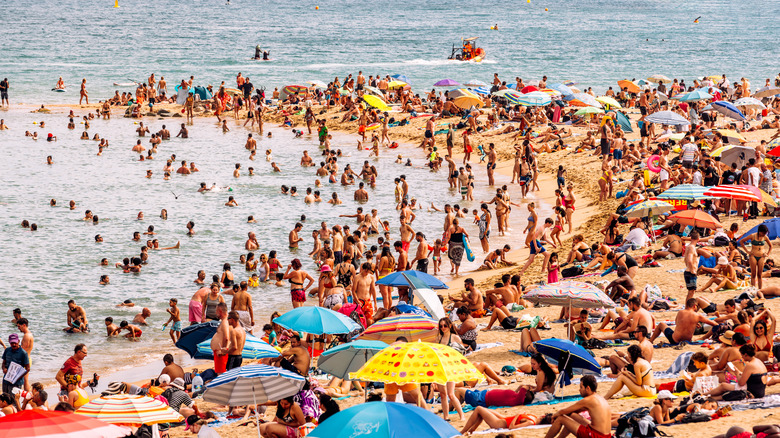What You Need To Know About Spain's Latest Efforts To Combat Rampant Overtourism
In Spain, the tourism bubble has reached its bursting point. More than 88.5 million foreign tourists traveled to the European country in 2024 (via La Moncloa). It is second only to France in the ranking of the world's most visited destinations, and its tourism industry is still growing in leaps and bounds year after year. Looking solely at the economic figures, many argue that the €118 billion that tourism contributes to the Spanish economy is an overwhelmingly positive figure. Yet, they don't account for the impact of mass tourism on the Spanish people and the cities that they scarcely recognize anymore. Where people once built communities, they now find themselves surrounded on all sides by a swell of Airbnbs and holiday rentals.
Social media commentators have expressed their frustrations with the situation, which has worsened significantly over the past two decades. Redditor u/3rd_Uncle notes about Barcelona (one of the most visited cities in Spain), "There is a generation of people who grew up here who have never really be able to experience their own city centre." Similarly, u/Pitiful_Bug_1011 from Seville noted that bars and restaurants would rather cater to tourists willing to pay inflated prices over locals who want a quick drink or snack. After losing their city streets, seeing their beautiful destinations sadly ruined by overtourism, and facing skyrocketing prices adjusted for tourist pockets, protesters took to the streets in 2024 to chant, "Tourists go home."
Despite all of this, tourism numbers are still on the rise, and new measures are aiming to mitigate some of the damage. If you're planning a trip to Spain's elegant cities or Mediterranean shores, you'll need to know the details of these changes, from new tourism taxes to strict new policies on vacation rentals and holiday homes.
What measures is Spain introducing and how will they affect visitors?
Confronting the worst consequences of the country's overtourism issue, the Spanish government is implementing new restrictions and policies in 2025. In particular, short-term travelers will be most impacted by a hike in tourist taxes. A charge paid upon check-in, tourist taxes are high in Europe's most popular cities, and they're on the rise in destinations like Tenerife, Seville, and Alicante.
Addressing the housing crisis exacerbated by tourism, Spain is scrapping its golden visa scheme, which grants residency to non-nationals who invest at least €500,000 in Spanish real estate. One out of every five houses sold in Spain was reportedly purchased by a foreign buyer in 2024, despite foreign nationals only accounting for 12.7% of the population just the year before. Spanish Prime Minister Pedro Sánchez has said that the scheme will be scrapped by April 2025, telling reporters, "Today, 94 out of every 100 such visas are linked to real estate investment ... it's almost impossible to find decent housing for those who already live, work and pay their taxes [in major cities]" (via Euractiv.com).
In 2025, the prime minister also revealed his plan to implement a 100% property tax for all non-EU residents purchasing homes in Spain. The move is an attempt to deter foreign investors who are only interested in profit, not living in Spain. This change has been paired with a crackdown on vacation rentals in Malaga's most affected areas, with plans to also implement a ban on short-term rentals in Barcelona by 2028. A clampdown on investment rentals advertised through companies like Airbnb will change the way that tourists plan their Spanish getaways.
How can visitors have a more positive impact during their Spain vacation?
So, you'll be paying more taxes on your next trip to Spain. Your cheap holiday rental options will be limited. You'll face a higher anti-tourism sentiment than found even in the other most "overtouristed" places in Europe, according to a YouGov survey. What can you do to make sure you aren't contributing to the crisis and upsetting the local social system while still enjoying your dream Spanish destination? One of the most commonly cited gripes is the rapidly rising rents, massively impacted by the influx of Airbnb investors. Sidestepping that issue is easy. Stay in a locally owned hotel where your money will go straight into the community rather than the pockets of a foreign investor.
Another is tourists' unwillingness to bend to local customs and the cities' willingness to change for short-term travelers. "If we have a model whereby people just visit for five days and then leave then it becomes a soulless theme park, without culture, without a community," one anti-tourism protester told the BBC. So, simply, do as the Spanish do: Don't insist on dinners served at 6 P.M. or rush diners lingering long after a meal is finished, learn respectful greetings in the local language, and don't make excessive amounts of noise during siesta hour.
Those loud and boisterous travelers especially rustle feathers. Reddit user u/c-est_aralc summed up that sentiment, listing "Drunk tourists that use our cities as a playground" as the number one reason for anti-tourism attitudes. Partiers were unperturbed by new fines introduced in 2024, continuing to dominate destinations like Ibiza and Majorca. Avoid becoming the subject of an anti-drunks protest by enjoying your sangrias and Spanish wines in moderation and remaining on your best behavior.


